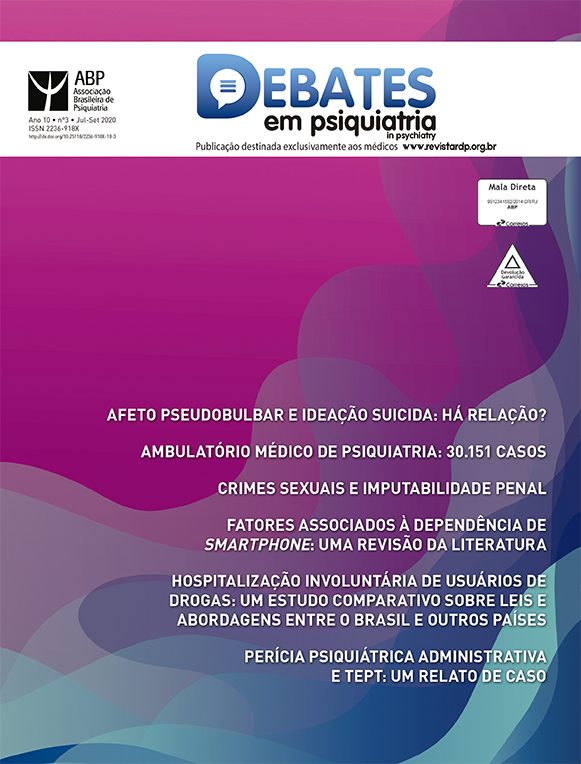Psychiatric outpatient clinic: 30,151 cases
DOI:
https://doi.org/10.25118/2763-9037.2020.v10.25Keywords:
Outpatient care, biological psychiatry, mental healthAbstract
Objective: To describe the characteristics of the service and the profile of users of the Dr. Jandira Masur psychiatric outpatient clinic, in São Paulo. Methods: A cross-sectional study was carried out with a convenience sample including all patients seen at the service from the beginning of operations, in August 2010, to December 2019. Results: This study is the largest outpatient study so far conducted in Brazil, consisting of 30,151 patients, mostly women (62%). The most prevalent diagnoses were mood and anxiety disorders (36.5%), followed by neurotic disorders, stress-related and somatoform disorders (29%). Also, we observed that the number of new patients increased over time and that the outpatient clinic enabled the opening of around 74 thousand vacancies during the study period. Conclusion: The psychiatric outpatient clinic assessed proved to be a reference as care management model in the field of mental health in the Brazilian Unified Health System in the city of São Paulo.
Downloads
Metrics
References
United Nations (UN). Transforming our world: the 2030 agenda for sustainable development. 2015 [Internet]. [cited 2020 Mar 05]. sustainabledevelopment.un.org/content/documents/21252030%20Agenda%20for%20Sustainable%20Development%20web.pdf
Organização Pan-Americana da Saúde (OPAS), Organização Mundial da Saúde (OMS). Relatório 30 anos de SUS, que SUS para 2030? [Internet]. 2018 [cited 2020 Aug 6]. iris.paho.org/handle/10665.2/49663
World Health Organization (WHO). People with mental disabilities cannot be forgotten [Intenet]. 2010 [cited 2020 Fer 10]. www.who.int/mediacentre/news/releases/2010/mental_disabilities_20100916/en/
World Health Organization (WHO). Depression and other common mental disorders: global health estimates. Geneva: WHO; 2017.
Brasil, Projeto de Lei n° 74/2014. Altera o Decreto-Lei nº 2.848/1940 – Código Penal – para tipificar o crime contra as pessoas com deficiência ou transtorno mental. legis.senado.leg.br/sdleggetter/documento?dm=4470721&ts=1567529344036&disposition=inline
Brasil, Ministério da Saúde. Saúde mental em dados 12 [Internet]. 2015 [cited 2020 Fev 05]. www.mhinnovation.net/sites/default/files/downloads/innovation/reports/Report_12-edicao-do-Saude-Mental-em-Dados.pdf
Brasil, Lei no 10.216, de 6 de abril de 2001. Dispõe sobre a proteção e os direitos das pessoas portadoras de transtornos mentais e redireciona o modelo assistencial em saúde mental. hpm.org.br/wp-content/uploads/2014/09/lei-no-10.216-de-6-de-abril-de-2001.pdf
Geraldini A, Liberal M De, Novais M, Zucchi P. Ambulatório médico de especialidades-psiquiatria Vila Maria: balanço dos dois anos iniciais. Psic Saude Doenças. 2017;18:503-11.
Brasil, Ministério da Saúde. Portaria nº 3.088, de 30 de dezembro de 2011. bvsms.saude.gov.br/bvs/saudelegis/gm/2011/prt3088_23_12_2011_rep.html
Casarin SNA, Villa TCS, Cardozo-Gonzales RI, Caliri MHL, Freitas MC de. Gerenciamento de caso: análise de conceito. Invest Educ Enferm. 2003;21:26-36.
Silveira AS, Siqueira AC, Oliveira FM, Nishio EA, Nóbrega MPSS. Gerenciamento de caso em ambulatório de psiquiatria, competências e prática da enfermeira. Enferm Foco. 2013;4:29-32.
Silveira ASA, de Oliveira CBF, Lessa F. Prontuário eletrônico e gerenciamento de caso em ambulatório de psiquiatria. J Health Inform. 2016;8:83-6.
Instituto Brasileiro de Geografia e Estatística (IBGE). Projeção da população do Brasil e das unidades da federação [Internet]. [cited 2020 Apr 01]. www.ibge.gov.br/apps/populacao/projecao/index.html?utm_source=portal&utm_medium=popclock
Araújo Filho GM, Amino D, Yamaguch LM, Silveira ASA, Laranjeira R, Tamai S. AME Psiquiatria: um ano de funcionamento. Debates Psiquiatr. 2012;2:44-9.
Organização Mundial da Saúde (OMS). Classificação estatística internacional de doenças e problemas relacionados com a saúde. 10ª revisão código internacional de doenças – CID [Internet]. [cited 2020 Aug 6]. pesquisa.bvsalud.org/portal/resource/pt/lis-LISBR1.1-11931
Melo APS, Guimarães MDC. Factors associated with psychiatric treatment dropout in a mental health reference center, Belo Horizonte. Braz J Psychiatry. 2005;27:113-8.
Belkin GS, Unitzer J, Kessler RC, Verdeli H, Raviota GV, Sachs K, et al. Scaling up for the “bottom billion”: “5x5” implementation of community mental health care in low-income regions. Psychiatr Serv. 2011;62:1494-502.
Organization for Economic Co-operation and Development (OECD). Economic surveys: Brazil: overview [Internet]. 2018 Feb [cited 2020 abr 5]. www.oecd.org/economy/surveys/Brazil-2018-OECD-economic-survey-overview.pdf
Erdmann AL, Andrade SR, Mello ALSF, Drago LC. A atenção secundária em saúde: melhores práticas na rede de serviços. Rev Lat Am Enfermagem. 2013;21:131-9.
Downloads
Published
How to Cite
Issue
Section
License

This work is licensed under a Creative Commons Attribution-NonCommercial 4.0 International License.
Debates em Psiquiatria allows the author (s) to keep their copyrights unrestricted. Allows the author (s) to retain their publication rights without restriction. Authors should ensure that the article is an original work without fabrication, fraud or plagiarism; does not infringe any copyright or right of ownership of any third party. Authors should also ensure that each one complies with the authorship requirements as recommended by the ICMJE and understand that if the article or part of it is flawed or fraudulent, each author shares responsibility.
Attribution-NonCommercial 4.0 International (CC BY-NC 4.0) - Debates em Psiquiatria is governed by the licencse CC-By-NC
You are free to:
- Share — copy and redistribute the material in any medium or format
- Adapt — remix, transform, and build upon the material
The licensor cannot revoke these freedoms as long as you follow the license terms. Under the following terms:
- Attribution — You must give appropriate credit, provide a link to the license, and indicate if changes were made. You may do so in any reasonable manner, but not in any way that suggests the licensor endorses you or your use.
- NonCommercial — You may not use the material for commercial purposes.
No additional restrictions — You may not apply legal terms or technological measures that legally restrict others from doing anything the license permits.






























